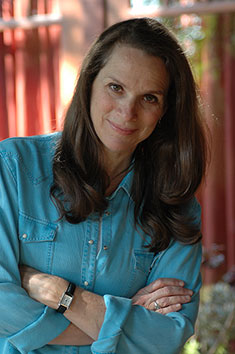The main question is “getability”—whether the actors are available and affordable, how quickly their handlers can read the script and pass it along, and when they might be willing to meet with the director. Zuckerman informs the group that for the role of Andrea, the famous novelist’s wife, Helena Bonham Carter isn’t available and Kristin Scott Thomas said no. Her agent in England liked the script, however, and suggested Sophie Marceau or Julia Ormond.
 “You think Bridget Fonda’s too cold?” Zuckerman asks. “Not good-looking enough?”
“You think Bridget Fonda’s too cold?” Zuckerman asks. “Not good-looking enough?”
“I don’t think she’s available,” Hickenlooper says, “I like Anne Heche a lot. She’s got that coldness. She’s great.”
“They actually liked Julia Ormond,” Zuckerman pushes, referring to Kronemyer and his financiers. “She’s right for this.”
“She’s boring,” Levitt moans.
“Totally boring,” Hickenlooper concurs.
“Not with a good director, George,” Zuckerman says. “Let’s put her down.”
“No one’s going to get excited about Andy Garcia and Julia Ormond,” Hickenlooper says.
“You can’t even go there,” Levitt adds.
The producers believe that Elysian’s marketability rests on the chemistry between Garcia and the actress who plays Andrea. Trouble is, Andrea doesn’t appear until page 48, so Levitt and Hickenlooper lobby for firm offers—and more money—to the male leads.
Zuckerman says he’s already offered the role of Luther, the escort service owner, to Jeremy Irons. “We gave him ten days,” he says. It is a common Hollywood strategy to cast leading men first, women second, with the rationale that men are bigger box-office draws and will attract top women to the project.
“I told you he’s doing a movie right now,” Levitt says. Having recently cast Irons in The Fourth Angel, she is current with his work. “He won’t be able to read it.” At both producers’ request, she agrees to call his agent and find out when, or if, Irons will look at the script.
Casting the Norman Mailer-like novelist Allcott will be tricky, Zuckerman says, because “there aren’t many older guys that have any real value.” But, he adds, “Jason Robards has read this and would like the part,” explaining that Robards is a friend of Andy Garcia’s agent. Other choices: James Coburn, Nigel Hawthorne, Peter O’Toole.
“I think he might be over-the-top,” Levitt says pointedly of O’Toole.
“You think?” Hickenlooper asks.
“Yeah,” Levitt says.
“What’s he done lately?”
“Some television.”
“What’s the story with Gregory Peck?” Pfeffer asks. “Does he work?”
“Occasionally,” Levitt says. “We like him. He’s on the list.”
Then Hume Cronyn’s name emerges. “I don’t know if he’s too old,” she says.
“Decrepit?” Zuckerman asks.
“He’s pretty spry,” Levitt says.
Albert Finney isn’t interested, Ian McKellen isn’t available, and Robert Duvall won’t get off his porch for less than a million dollars. Their names are scratched from the list.
“What about casting real writers?” Levitt wonders aloud.
“Is Gore Vidal too gay?” Hickenlooper asks.
“Yeah, he’s not right,” Levitt says, adding that Kingdom and the Power author Gay Talese isn’t old enough.
“On this list, Donald Pleasance is deceased,” Hickenlooper says.
“Okay, thank you,” Levitt says.
They stare at the names. “Isn’t Art Carney deceased, too?” Hickenlooper asks.
“No, he’s still alive in Connecticut. I’ve been dying to find him a cameo.”
“He’s fabulous,” Hickenlooper agrees. “That would be a cool piece of casting.”
“Very street, very blue-collar,” Pfeffer says, pulling up his yellow socks. “What do you think of Coburn?”
“He’s vital and sexy,” Levitt says. “The thing is, he doesn’t quite seem intellectual.”
“I like Coburn,” Hickenlooper says. “He’s one of my first choices.”
“I love all these guys,” Levitt says. “They’re all interesting.”
“What about Jack Lemmon?” Hickenlooper asks. “Andy Garcia keeps bringing up his name.”
“Yeah, I love Jack Lemmon,” Levitt says, trying to move the meeting along. “He’s a wonderful actor. I mean, any of these people are really good choices. Now, let’s find out what the reality is.”
The reality is exactly what Levitt feared. When Hickenlooper mentions his fondness for Frank Langella, Pfeffer reminds him, “We’re not going to get the budget we need with that kind of name.” Such a small name, he means, touching upon Hollywood’s most insidious cause-and-effect loop: While casting depends on the initial budget, the ultimate budget will depend on casting. With a big enough name on board, the producers can go to their financiers for “breakage”—extra money —to cover the actors fee.
Levitt makes no secret of her irritation. “We’re back to this game,” she says to Pfeffer. “I thought we didn’t have to have a name.”
“We need a couple of names,” Pfeffer says, almost sheepishly.
She shoots him a look. “Are you willing to pay five hundred thousand for two weeks?”
“Well, if it’s Paul Newman,” Zuckerman dreams.
Levitt excuses herself to make a phone call. When she returns, she advises the group that Jeremy Irons will finish his current film the first week of October.
“How much would you pay him?” she asks.
“For a week?” Pfeffer asks. “Two hundred. If we have to go a little higher, we probably could.”
“Now,” Zuckerman jokes as the meeting adjourns, “we’re going to see if we can fuck it up.”
“How badly we can fuck it up,” Pfeffer says.
Levitt reminds the producers that she hasn’t been paid yet.
“Oh, Heidi, you know you can trust us,” Pfeffer says, smiling.
The following week, Jason Robards is on board.



